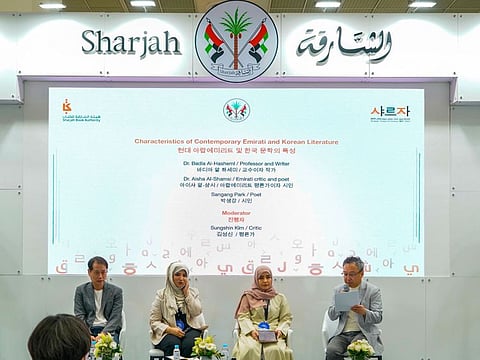Emirati and Korean literary minds unite at Seoul Book Fair
Seoul Book Fair sees engaging discussion on context, identity; human values stressed

Seoul: A gathering of Emirati and Korean writers and critics agreed on the importance of contextual analysis in understanding literary works. They emphasised the interplay between literature and society, asserting that comprehending a literary piece requires awareness of its social context, historical background, and the characteristics of the era in which it was written. They highlighted similarities in contemporary literature in the UAE and Korea.
The discussion took place at the Sharjah Guest of Honour pavilion during the 65th Seoul International Book Fair. Titled ‘Characteristics of Contemporary Emirati and Korean Literature,’ the session was moderated by Korean critic Sungshin Kim. The panel included Emirati critic, author, and Arabic language and literature professor Dr. Badiaa Al Hashemi, Emirati poet and critic Dr. Aisha Al Shamsi, and Korean poet Sangang Park.
Dr. Al Hashemi focused on the local environment and folk heritage depicted in Emirati literature. Tracing the evolution of Emirati novels, she highlighted author Maryam Al Ghafly as an example, noting her skillful incorporation of Emirati identity, customs, traditions, and folk heritage. This effort aims to preserve the collective memory of the region.
Al Hashemi also emphasised the symbolic significance of Emirati literature emerging alongside the founding of the UAE. She mentioned writer Rashid Abdullah Al Nuaimi’s 1971 novel ‘Shahanda,’ which marked the commitment of the first generation of Emirati authors to nation-building and strengthening the Emirati identity. This pivotal moment opened doors for future generations to explore their ancestors’ lives and participate in the monumental task of building their nation.
Dr. Al Shamsi discussed Emirati poetry, categorising its characteristics based on three generations of poets. The first generation adhered to traditional poetic structure, while the second generation embraced free verse poetry after the arrival of Emirati newspapers. Presently, a third generation of poets continues to shape Emirati poetry. Al Shamsi clarified that these classifications are fluid due to overlapping periods during the emergence of Emirati literature, serving as a critical framework rather than strict chronological definitions.
Park then explored Korean literature, focusing on the novel as a mature genre that emerged after the Korean War and the division of the peninsula. He highlighted author Choe Inhun and his novel ‘The Square,’ which vividly depicted ideological rifts, the aftermath of war, and social fragmentation in the 1960s. Park also noted Korean writers’ experimentation, transitioning from realism to modernism, reflecting the evolving dynamics of Korean society, especially in the southern region. “Korean literature offers a rich tapestry that delves into the essence of the human spirit, the complexity of life, and the flow of ideas,” he stated.
Common human values highlighted
During another insightful dialogue session titled ‘The Human Aspects in Emirati and Korean Literature’, part of the Sharjah Guest of Honour programme at the book fair, Emirati and Korean intellectuals highlighted the presence of human elements in literary works from both countries, emphasising the shared reverence for human values in Arab and Korean cultures.
In the session, Prof. Zainab Al Yassi, an author and Arabic and cultural literature critic, and Korean literary critic Roh Taehoon engaged in a panel discussion moderated by Baek Hyewon, an Arabic language teacher in Korea.
Literature, they affirmed, is a source of inspiration and influence for humanity. Al Yassi eloquently expressed that literature, throughout history, has captured diverse aspects of humanity while inspiring and influencing individuals. She emphasised that literature goes beyond entertainment and self-expression, serving as a catalyst for learning, personal growth, and societal advancement. It presents role models, examples, and stories that deepen our understanding of ourselves, others, and the world while fostering essential skills, creativity, and ethical sensibilities. Thus, literature plays a vital role in shaping individual identities, cultures, and civilisations.
Al Yassi noted that literature acts as a mirror, reflecting the fundamental human values that guide our behaviour and outlook on life. It explores timeless conflicts between good and evil, selflessness and greed, love and hatred, and other elements that affect our daily existence. Drawing from her novel ‘Thawat’, she highlighted the symbolic representation of women as embodiments of unconditional goodness and benevolence, while also revealing the human side of a mother’s character — a multidimensional portrayal encompassing emotions, fallibility, and personal struggles. The novel raises a crucial question about the triumph of righteousness in a malevolent world.
Shifting the focus to Korean culture, Taehoon emphasised that the concept of humanity in Korean culture is rooted in feelings and love. He drew attention to the linguistic connection between the Korean terms for ‘human’ and ‘love’, highlighting their striking phonetic resemblance. He further explained that modern Koreans seek to understand their individuality and humanity through psychological and personality analysis, which demonstrates the enduring emphasis on human values in Korean culture.
Sign up for the Daily Briefing
Get the latest news and updates straight to your inbox



